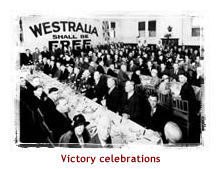Victory? The Grand Victory Festival held on the 10 May 1933 represented the high
point in the brief history of the Dominion
League of Western Australian. In three short years they had
achieved an incredible victory.
The Grand Victory Festival held on the 10 May 1933 represented the high
point in the brief history of the Dominion
League of Western Australian. In three short years they had
achieved an incredible victory. The
Grand Victory celebration dinner included speeches, toasts and songs. The
official programme lists toasts to The King and to The Navy, Army and Air
Force, presumably those of the United Kingdom, not the Commonwealth of Australia.
Speeches made include The Day We Celebrate by Norbert Keenan MLA,
The Dominion League of Western Australia by Sir Walter James, The
Parliament of Western Australia by H.P. Downing and The Press
by T.A. Hartrey. Those present also sang hearty renditions of God Save
the King, Westralia
Free, This
Bit of the World Belongs to Us!, and Our Song of Liberty. The
Grand Victory celebration dinner included speeches, toasts and songs. The
official programme lists toasts to The King and to The Navy, Army and Air
Force, presumably those of the United Kingdom, not the Commonwealth of Australia.
Speeches made include The Day We Celebrate by Norbert Keenan MLA,
The Dominion League of Western Australia by Sir Walter James, The
Parliament of Western Australia by H.P. Downing and The Press
by T.A. Hartrey. Those present also sang hearty renditions of God Save
the King, Westralia
Free, This
Bit of the World Belongs to Us!, and Our Song of Liberty. But
victory in the referendum represented success in just one battle. The newly
elected Labor Government opposed secession but fulfilled its obligation
to respect the referendum result by appointing a delegation to present a
Petition to Secede to the Imperial Parliament in London. Delegates were
selected from members of the Dominion League and spent their time before
departing for Great Britain in 1934 drawing up a case for secession. But
victory in the referendum represented success in just one battle. The newly
elected Labor Government opposed secession but fulfilled its obligation
to respect the referendum result by appointing a delegation to present a
Petition to Secede to the Imperial Parliament in London. Delegates were
selected from members of the Dominion League and spent their time before
departing for Great Britain in 1934 drawing up a case for secession.With Dominion League activists like H.K. Watson deeply involved in the quiet processes of the delegation, Collier was able to remove secession from the political centre stage and the public spotlight. In the meantime his government got on with the business of managing the gradual economic recovery being experienced throughout Australia. As an issue, secession had been effectively sidelined by the time the delegation received a response from the British Parliament in May 1935. |
Please note: The content on this website is made available for archival purposes and may not meet the State Library of Western Australia's current standards for web accessibility, mobile device compatibility, historical accuracy and cultural sensitivity.